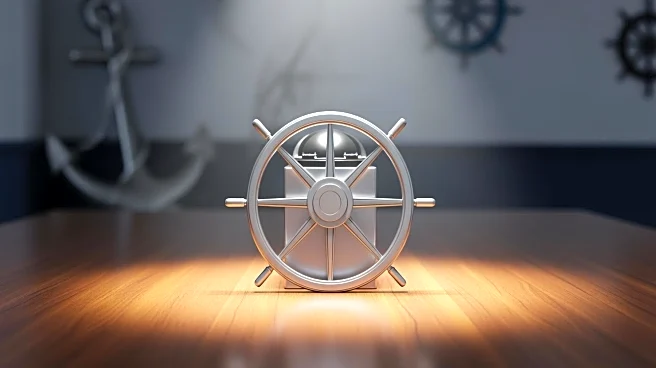What's Happening?
The International Maritime Organization (IMO) has decided to adjourn discussions on the Net-Zero Framework for one year, a move that has sparked reactions from various industry stakeholders. The decision was made during the IMO's Marine Environment Protection
Committee meeting, where delegates faced what Andrew Forrest, founder of Fortescue Metals Group, described as 'intimidatory tactics' affecting their ability to vote freely. Industry leaders, including Thomas A. Kazakos of the International Chamber of Shipping and Kostas Gkonis of INTERCARGO, expressed disappointment over the lack of consensus, emphasizing the need for clarity to make necessary investments for decarbonizing the maritime sector. The World Shipping Council highlighted the industry's commitment to achieving net-zero emissions by 2050, having already invested $150 billion in green fuel ships. Despite the postponement, stakeholders remain committed to working with governments to ensure regulatory consistency and support for renewable fuel production.
Why It's Important?
The adjournment of the IMO's Net-Zero Framework discussions is significant as it delays the establishment of a global regulatory framework essential for the maritime industry's decarbonization efforts. This postponement creates uncertainty for industry stakeholders who require clear guidelines to make substantial investments in green technologies and fuels. The shipping industry, being international, relies on coherent global regulations to ensure a level playing field and facilitate its energy transition. The delay could impact the industry's ability to meet the 2050 net-zero emissions target, potentially affecting global trade and environmental goals. The situation underscores the need for international cooperation and consensus to address climate change effectively, as well as the importance of overcoming geopolitical challenges that may hinder progress.
What's Next?
Following the adjournment, industry leaders are urging IMO member states to use the time constructively to bridge differing positions and ensure the industry's voice is heard in future discussions. INTERTANKO's Tim Wilkins sees this as an opportunity to refine the regulatory framework to address ambiguities and concerns raised by members. European Shipowners, represented by Sotiris Raptis, emphasize the need for meaningful global regulations to decarbonize shipping and will continue working with international partners to reach an agreement. The delay presents a chance for climate-ambitious countries to build a strong majority in support of decarbonization, potentially benefiting from the future economy. The industry remains committed to collaborating with governments to deliver necessary regulatory consistency and support for renewable fuel production.
Beyond the Headlines
The postponement of the IMO's Net-Zero Framework discussions highlights deeper issues within international climate negotiations, such as geopolitical tensions and vested interests that can impede progress. The situation raises ethical questions about the influence of intimidation tactics on global decision-making processes. It also underscores the cultural shift needed within the industry to prioritize environmental sustainability over short-term economic gains. Long-term, the delay could affect the pace of innovation and investment in green technologies, impacting the maritime sector's ability to contribute to global climate goals. The industry's response to this setback will be crucial in shaping future regulatory frameworks and ensuring a sustainable transition.
















